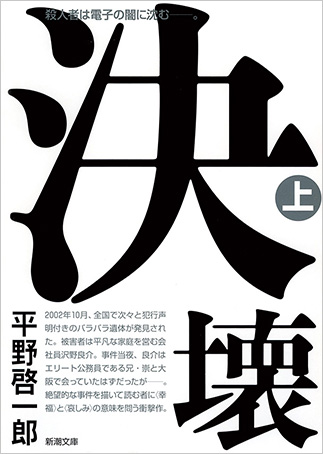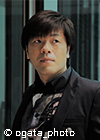
OTHER LIVES
Kekkai
[Breach]
Vol. I: Shinchōsha (Shinchō Bunko), 2011. 480 pp. ¥670. ISBN 978-4-10-129041-6.
Vol. II: Shinchōsha (Shinchō Bunko), 2011. 513 pp. ¥710. ISBN 978-4-10-129042-3.
Also published in: Korean
Hirano Keiichiro, one of the premier established writers of modern Japanese literature, made a sensational debut in 1998 with Nisshoku [The Eclipse], a novel set in medieval France. In the ensuing years, he followed up with his longest-ever novel Sōsō [Farewell to the Departed], which fictionally depicts such historic personages as Eugène Delacroix and Frédéric Chopin in nineteenth-century France. These were two thoroughly intellectual novels completely dissociated from the reality of today’s Japan.
In Kekkai, however, Hirano switches gears a decade after his debut to take a good look at the festering underbelly of modern Japanese society. Set in the fall of 2002, the tale gives an account of the gruesome discoveries of a severed human head, hands, feet, and other body parts, first in Kyoto and then other locations across Japan. Next to the head is found a defiant note from the killer, who signs the message as Akuma [the Devil]. The story underscores the violence rampant in modern society, as well as the dark side of humans that has been unleashed by the Internet. Accordingly, the title serves as a warning that modern society is in danger of committing a fatal error that will cause the dam to burst.
On the whole, the narrative evokes the prophetic vision used by Fyodor Dostoevsky to probe human crime and punishment. However, there is no God in Kekkai; instead, it is a story of crime in a godless age. (NM)
In Kekkai, however, Hirano switches gears a decade after his debut to take a good look at the festering underbelly of modern Japanese society. Set in the fall of 2002, the tale gives an account of the gruesome discoveries of a severed human head, hands, feet, and other body parts, first in Kyoto and then other locations across Japan. Next to the head is found a defiant note from the killer, who signs the message as Akuma [the Devil]. The story underscores the violence rampant in modern society, as well as the dark side of humans that has been unleashed by the Internet. Accordingly, the title serves as a warning that modern society is in danger of committing a fatal error that will cause the dam to burst.
On the whole, the narrative evokes the prophetic vision used by Fyodor Dostoevsky to probe human crime and punishment. However, there is no God in Kekkai; instead, it is a story of crime in a godless age. (NM)

Translation rights inquiries
Cork Inc.
3-2-3-5F Shibuya, Shibuya-ku, Tokyo
150-0002
Email: info+hirano@corkagency.com
(When sending an e-mail, please enter a half-width character "@" instead of a full-width character "@.")


